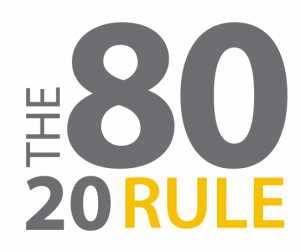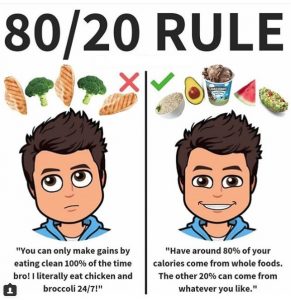Before I delve into the 80/20 rule and whether or not it’s right for you, we need to differentiate between which 80/20 rule we’re talking about. If you’re an economics major or work in the financial field, you’ve no doubt heard of the 80/20 rule otherwise known as Pareto’s Rule. It states that roughly 80% of revenue is generated by 20% of the work. If you Google “80/20 rule” you’ll also see references to the 80/20 rule in marriage, the 80/20 rule in marketing and the 80/20 rule in management. None of that is what we’re talking about here. What we’re talking about here is a discipline level: that of 80% discipline, 20% relaxation… or at least loosened restrictions.
Muscle & Fitness magazine posted an article about using the 80/20 rule in fitness, written by Andrew DeWitt. There is no date I can find for the publication. DeWitt describes the 80/20 rule applied to fitness as the idea that 80% of your successes come from 20% of your efforts. That’s one approach and one you should probably keep tucked away (as there’s more than one application for the 80/20 rule). That approach DOES likely apply. I’m not (yet) a certified personal trainer, nor a sports nutritionist (I’m pursuing certification in both). But I’ve participated in enough strength training to hear many a certified trainer make the statement that all of the progress is made in the last two to three repetitions of work. If you’re doing ten reps, then two is 20%. If 80% of your progress is generated in those last two (usually hellacious and painful) reps, then the 80/20 rule described by DeWitt applies.
 Virtually everything else I found in my research was from folks writing about how only 20% of effort, discipline, mindfulness… whatever… only 20% could gain your 80% of whatever you’re chasing. NONE of that is what I think about when I think about “the 80/20 rule as applied to fitness.” I think about it as a measure of discipline and how we manage ourselves and our commitment. The ONE exception I found was an image that showed weight loss as 20% exercise and 80% diet (as in healthy eating, not eating less). Those numbers get argued as well but are representative of an absolute: if you want to lose weight, the real work gets done in the kitchen.
Virtually everything else I found in my research was from folks writing about how only 20% of effort, discipline, mindfulness… whatever… only 20% could gain your 80% of whatever you’re chasing. NONE of that is what I think about when I think about “the 80/20 rule as applied to fitness.” I think about it as a measure of discipline and how we manage ourselves and our commitment. The ONE exception I found was an image that showed weight loss as 20% exercise and 80% diet (as in healthy eating, not eating less). Those numbers get argued as well but are representative of an absolute: if you want to lose weight, the real work gets done in the kitchen.
What I’m talking about is how you approach disciplining yourself for nutrition and exercise of any kind. When you think about resolutions, as an example, many of them fail because people set resolutions that demand 100% compliance forever. That makes no sense. We humans are imperfect beings. How about if we set goals that are attainable via actions that are sustainable because they allow for us to be flexible in our application? (say that ten times real fast)
There are a lot of people who decide that they are going to cut junk food out of their life, or that they’re going to start exercising every day, or… pick a new discipline. The challenge they face is that they jump into this new discipline without thinking about taking a break, giving themselves rewards, “cheat” days (I like to call them “treat” days) or what have you. It’s the rare person who can discipline him or herself 100% of the time. We all need a break sometime and if we earn a reward, we all like to receive that reward.
So, as an example, if you’re setting new goals for health and fitness that include eating cleaner and exercising regularly, how do you set goals you can keep? You PLAN to give yourself days off, treat days, rewards, etc. I’ll use my wife and I as the example.
A little more than two weeks ago we launched into a new health and fitness regimen. The nutritional program we use is BeachBody / Shakeology and the fitness program we’re starting with is the LIIFT4 program that mixes strength training and High Intensity Interval Training (HIIT). To keep ourselves within the nutritional guidelines we planned meals and did our grocery shopping accordingly. We purchased the necessary supplements, healthy snack foods and a couple Shakeology products (shakeology mixes and beachbar snack bars). We subscribed to the BeachBody on Demand service that allows us to choose from over 700 programmed workouts so we won’t get bored with repetitive and tedious workouts.
But we also thought about our usual schedules in a given month. My wife works retail and is off every other weekend, so we could have “date night” every other Friday night. We decided that on that one Friday night, every other week, we could eat out and, while still being mindful of our health goals, maybe exceed our calorie allowances or have that extra margarita (for her). It’s a day we PLAN on not being as disciplined. We also know, looking long term, that at least once a year we go give blood as part of our physical exams. After we give blood (usually at about 6:30 am), we go to the Starbucks across the street and get coffee. That coffee is fat filled and has more sugar than we should probably take in, but it’s a tradition we’ve had and we look forward to keeping. It’s one coffee treat. It’s not the end of the world.
The LIIFT4 program comes with schedule rest days – three of them per week – and on them you can do one of the recovery/stretch programs or you can simply take the day off. We decided that while we probably should do one of the stretch / recovery programs on the rest days, the way they work out are Wednesday, Saturday and Sunday. We decided we’d try to do the stretch / recovery programs Wednesday and Saturday and skip Sunday unless we were feeling exceptionally motivated.
My point is that we planned in breaks and treats. We planned on not requiring ourselves to be 100% dedicated and motivated 100% of the time. That’s just not realistic long term. And for those of you saying, “Well, yeah it is…” I want you to think about someone you know who is like that. Very few of us know anyone who is that disciplined, and if they are, usually we think they have something just a little out of place between their ears.
 So when I encourage people to think about the 80/20 rule where health and fitness are concerned, what I’m talking about is disciplining yourself 80% of the time and slacking or relaxing 20% of the time (as a maximum). Sure, you can discipline less and slack more, but pretty soon you stop seeing any improvement and then your discipline can go down the drain. 80% is a happy number that lets you have your breaks, enjoy your treats, etc. but also keeps you motivated enough to continue to pursue your goals – whatever they may be.
So when I encourage people to think about the 80/20 rule where health and fitness are concerned, what I’m talking about is disciplining yourself 80% of the time and slacking or relaxing 20% of the time (as a maximum). Sure, you can discipline less and slack more, but pretty soon you stop seeing any improvement and then your discipline can go down the drain. 80% is a happy number that lets you have your breaks, enjoy your treats, etc. but also keeps you motivated enough to continue to pursue your goals – whatever they may be.
When you ask if the 80/20 rule is right for you, you are the only person who can answer that. Your answer might be 85/15, 90/10 or 75/25. My wife and I, with our one day of rest per week and one day of eating out every two weeks are probably closer to the 85/15… for now. When we reach our current goals, we might adjust to 80/20. Then again, by then, we might be so used to where we are in our controls that we just stay with them.
What works for you?



One Reply to “Is the 80/20 Rule Right For You?”